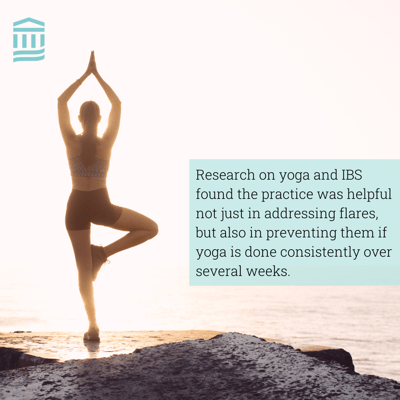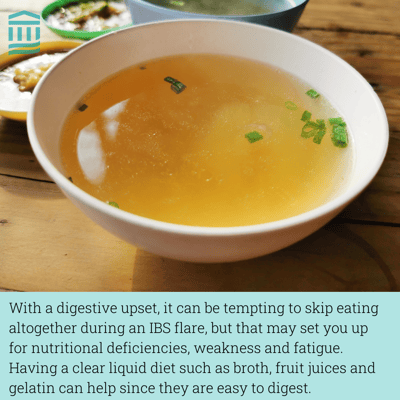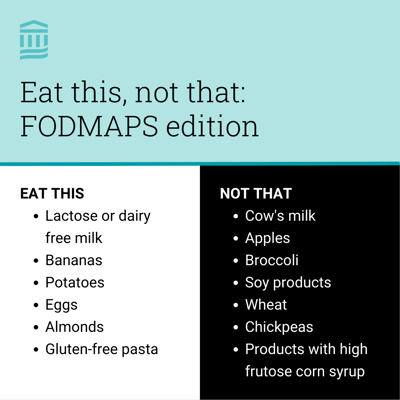When irritable bowel syndrome (IBS) flares, here's how to put out the flames
For many who are living with "irritable bowel syndrome," or IBS, the disorder is far from a minor inconvenience. Read on for some strategies to manage IBS flares, including foods to avoid.
IBS symptoms can include nausea, gas, bloating, diarrhea, constipation, migraines, and general discomfort. Severe IBS symptoms might include debilitating and sudden pain that limits the ability to work or socialize or chronic pain that feels like a constant ache. These symptoms can have a ripple effect on sleep, mood, and exercise capacity, which can, in turn, worsen the effects of IBS.
The top tip for managing IBS is to talk with your doctor, since symptoms like these may be part of a different underlying diagnosis. Once that's ruled out, and IBS is determined to be the culprit, your gastroenterologist may recommend prescription medications that can minimize or eliminate your symptoms. However, even with those, IBS flares can come up.
Here are some strategies for quenching that fire when they do:
Take a break
The link between psychological stress and IBS is a strong one, and some research indicates stress is a common cause of IBS development. When you're feeling overwhelmed or frazzled, that can cause inflammation in the digestive system that intensifies IBS symptoms.
Having de-stress tactics prepped in advance can help quite a bit, so you know what works for you. Some options include deep breathing exercises, visualization in which you imagine yourself in a peaceful environment, going outside into nature, or progressive muscle relaxation.
Get gentle movement
Although issues like abdominal cramping and bloating might make you feel like spending the whole day on the couch—or in bed—integrating some easy movement into your flare can be beneficial.
For example, research on yoga and IBS found the practice was helpful not just in addressing flares, but also in preventing them if yoga is done consistently over several weeks. Even going for a leisurely walk may help with symptoms—one study noted that this can reduce bloating and gas, as well as lower inflammation levels.
Consider liquid nutrition
Because of digestive upset, it can be tempting to skip eating altogether during a flare, but that may set you up for nutritional deficiencies, weakness, and fatigue. Also, a lack of essential nutrients can actually exacerbate digestive symptoms. Switching to the right liquids temporarily can tamp down inflammation and gut sensitivity while keeping you nourished.

When comparing products like protein shakes or making a smoothie on your own, look at ingredient labels to ensure you're not consuming common allergens like dairy, gluten, soy, corn, nuts, artificial colors, or artificial flavors. You can also try a clear liquid diet for a couple of days, such as broth, fruit juices, and gelatin. If your symptoms aren't resolving even with this switch, consider giving your doctor a call.
Switch to FODMAPS
If you can tolerate food without exacerbating symptoms, an approach suggested by Harvard Medical School is the FODMAP diet. This stands for "fermentable oligosaccharides, disaccharides, monosaccharides, and polyols." These are specific types of carbohydrates that increase the amount of fluid in the bowel and speed digestion. Research has found that up to 86 percent of IBS patients following the diet reported symptom improvement.

This type of diet involves eating less dairy, some fruits, sweeteners, wheat, and certain vegetables such as cauliflower and broccoli while increasing consumption of protein, oats, nuts and seeds, berries, and vegetables like carrots and lettuce. The diet isn't meant to be long-term; after eliminating the problematic foods, you re-introduce them gradually and monitor your symptoms to see which ones may be contributing to flares.
In general, people with IBS may need to use several different strategies to tamp down their symptoms, and it's helpful to keep track of what works and what doesn't, so you have ideas for shutting down a flare faster in the future. You can find more resources here.
If you're a member of Mass General Brigham Health Plan, you can also access our resource library on the member portal for additional guidance on how to manage this condition.
For more health and wellness education from Mass General Brigham Health Plan, follow us on social @MGBHealthPlan
⬇️




